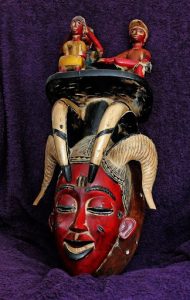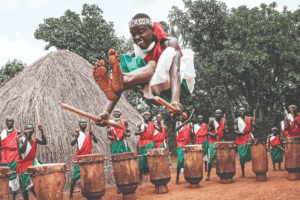
“A people without the knowledge of their past history, origin, and culture is like a tree without roots.” — Marcus Garvey
African history, with all its grandeur and grit, is often tucked away in dusty archives, entombed in sepia-toned photographs, or whispered in the crackling voices of our grandparents. Their tales of kingdoms that spanned horizons, of warriors who etched their names in blood and valor, of women whose voices thundered against oppression, are at risk of fading into mere echoes. But today, Nollywood, Africa’s storytelling titan, is wielding the power of cinema to rip the veil off forgotten epochs, transforming screens into portals that bridge the past and the present.

There is something almost spiritual about watching history unfold on screen. A well-crafted historical film is not just a re-enactment; it is a resurrection. Funmilayo Ransome-Kuti, by Bolanle Austen-Peters, a multiple award-winning director, producer and cultural entrepreneur, does not merely tell the story of a woman, it breathes life into an era. Through lush cinematography and evocative dialogue, the audience is transported to bustling markets where Funmilayo’s fiery activism rallied women against unfair colonial taxation. Her voice, sharp and unyielding, becomes a rallying cry for women and girls’ rights, a fight that echoes to this day. The film’s reception was monumental, sparking renewed conversations about women’s roles in political activism in Nigeria.

In Anikulapo, directed by Kunle Afolayan (an actor credited for elevating the quality of Nollywood movies), the tapestry of Yoruba folklore is unraveled with a richness that transcends mere storytelling. It is a spellbinding tale of love and betrayal, of mystical powers and moral consequence. The landscapes serve not just as backdrops but as living, breathing characters in the story. Released on Netflix to global audiences, it sparked conversations about cultural preservation and the importance of African folklore in contemporary cinema.

Then comes Jagun Jagun, a powerful movie directed by Tunde Kelani. It’s a war epic that crashes onto the screen with the thunder of ancestral drums and the sharp tang of iron. It is a visceral retelling of warriors who did not merely fight but sacrificed, and solidified legacies that ripple across generations. The film is more than blood and battle; it is a homage to resilience, to the spirit of a people who chose freedom over fear, sovereignty over subjugation. Critics lauded its bold cinematography and unflinching portrayal of pre-colonial resistance.

Films like October 1 and 93 Days also serve as crucial historical markers. October 1 is a psychological thriller set against the backdrop of Nigeria’s independence, blending fiction with real historical tension, while 93 Days chronicles the brave response to the Ebola outbreak, immortalizing moments of unity and sacrifice.
Through these films, Nollywood elevates history to a place of reverence and remembrance. These are not just stories; they are cinematic griots, bearing witness to the epochs that shaped our destiny.
There is a powerful connection that comes from witnessing the struggles and triumphs of those who came before us. Nollywood’s historical films educate, inspire, and awaken something deep within us. Watching these movies is like stepping back in time, feeling the weight of colonial oppression, the strength of rebellion, and the unbreakable unity of women and men who refused to be silenced. We are reminded of how fragile communities are and how easily culture can be lost if not protected.
The stories bring history to life with a heartbeat you can feel. They remind us of warriors who fought not for glory, but for survival. We see the faces of those who stood their ground, defending their lands against powerful enemies. These films are living memorials preserved on screen, capturing moments that time cannot erase.
But these movies are more than memories; they are mirrors. They reflect the strength and flaws of our past. The resilience, the mistakes, the victories, and the losses. Through these stories, we are challenged to think about where we came from and, more importantly, where we are headed.

Cinema, in its purest form, is the art of memory. Nollywood’s historical epics serve as bridges spanning the chasm between generations, connecting those who lived through these times to those who may never hear the tales firsthand.
Imagine a young girl, eyes wide with wonder, watching Queen Amina for the first time. She is not merely consuming a story; she is inheriting a legacy. She learns that before there were skyscrapers and bustling metropolises, there were empires like Zazzau ruled by warrior queens who expanded territories and defied norms.
These films challenge the narrative that African history began with colonization. They reveal empires that thrived, and communities that governed themselves long before external forces drew borders across their lands.
Nollywood’s historical films are crossing borders on platforms like Netflix and Prime Video. Diaspora audiences are engaging with stories they never learned in Western classrooms, reconnecting with roots that stretch back to royal courts and battlefields. In this way, Nollywood is not just telling Africa’s stories; it is archiving its truths.
For every film that makes it to the screen, there remain untold stories buried beneath the sands of time. Where is the grand cinematic retelling of the Aba Women’s Riot of 1929, when thousands of Igbo women defied colonial authority in a blaze of defiance? Where is the sweeping epic that captures the legacy of King Jaja of Opobo, who resisted British imperialism with sheer tenacity?
Part of the challenge lies in funding and industry priorities. Historical films are expensive to produce, demanding elaborate sets, costumes, and detailed research that many studios are hesitant to fund. Despite the growing appetite for African stories, the market sometimes favors contemporary narratives over the painstaking recreation of history.
However, visionaries like Kunle Afolayan and Ibrahim Chatta are changing the game. Their investment in film villages; vast, immersive sets dedicated to large-scale productions has lowered the barriers to crafting historical epics. Afolayan’s KAP Film Village in Oyo State, and Chatta’s emerging projects are proving that with the right infrastructure, ambitious storytelling becomes not just possible, but inevitable. These spaces are helping filmmakers recreate pre-colonial settings with authenticity, reducing costs and increasing production value. They are literal stages where history is reborn, frame by frame.
Platforms like Netflix have proven that there is a global appetite for these tales. The success of Anikulapo is evidence that audiences both local and in the diaspora, are hungry for historical narratives. It is time for Nollywood to seize this moment, to dig deeper, to unearth the legends and rebellions that shaped our lands. These stories do not just deserve to be told; they demand it.
There is power in remembering. Nollywood’s historical tales are not just films; they are acts of reclamation. They allow us to hold our past in our hands, to turn it over and inspect its creases and scars. They remind us that before we were colonized, we were kingdoms. Before we were subjects, we were sovereign.
And perhaps, most importantly, they remind us that the battle to remember is, in itself, an act of resistance.








Don’t miss a thing! Sign up to get new content sent directly to your inbox.